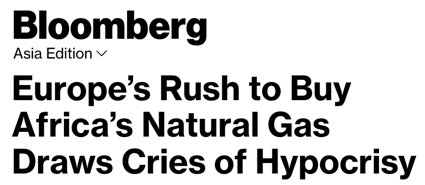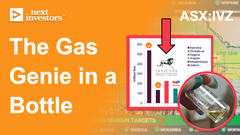African gas in high demand, EU looks to replace Russian supply
The following article from Bloomberg highlights the European rush to African gas supplies to replace Russian supply.

Read the full article here.
Below are our key takeaways:
- The EU wants to import as much African gas as it can.
- Nigeria has 3% of the world's proven gas reserves, yet has tapped almost none of it. Like most African countries, what has been extracted is mostly sent to Europe, which now wants to import even more to make up for supplies lost to Moscow’s invasion of Ukraine.
- Italy recently signed a deal to buy gas from Angola and the Democratic Republic of the Congo, while Germany has been looking to secure supplies from Senegal.
- Many African leaders support boosting gas exports to help their cash-strapped governments, but they also want access to financing that would allow them to harness the fuel’s potential to create domestic natural gas markets.
- A recent spate of major discoveries has led to big private projects with supermajors including Exxon Mobil, BP and Shell spending tens of billions in Mozambique, Tanzania, Senegal and Mauritania to extract more gas for export.
- The supermajors plan to grow existing LNG facilities in Nigeria and Angola to help Africa produce 470 billion cubic metres of gas per year by the late 2030s, equal to about 75% of Russian output this year, according to consultants Rystad Energy.
The article clearly lays out the structural demand for African gas from developed EU nations like Germany, Italy and Spain.
The demand comes as gas prices reach astronomical highs all across the EU and the need to transition away from a reliance on Russian gas becomes a lot clearer.
We have exposure to this macro thematic through our 2020 Energy Pick Of The Year Invictus Energy (ASX: IVZ) which is gearing up to drill its elephant scale prospect in Zimbabwe with the potential to open up an entirely new oil and gas basin in Zimbabwe.
Just last week, IVZ upgraded its prospective resource to a giant 20 trillion cubic feet (Tcf) and 845 million barrels of gas condensate.
The prospective resource now stands at a total of 4.3 billion barrels of oil equivalent on a gross mean unrisked basis.
With drilling expected to commence in August, we think IVZ has timed its drilling program to perfection — any new discovery is likely to garner a lot of international interest, especially from the EU.






